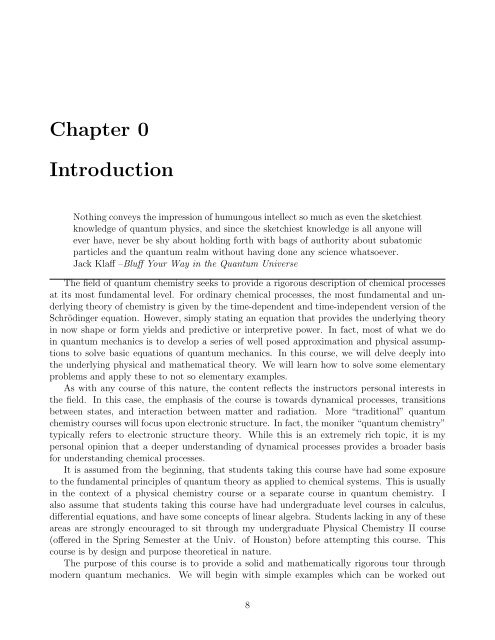Quantum Mechanics - Prof. Eric R. Bittner - University of Houston
Quantum Mechanics - Prof. Eric R. Bittner - University of Houston
Quantum Mechanics - Prof. Eric R. Bittner - University of Houston
Create successful ePaper yourself
Turn your PDF publications into a flip-book with our unique Google optimized e-Paper software.
Chapter 0<br />
Introduction<br />
Nothing conveys the impression <strong>of</strong> humungous intellect so much as even the sketchiest<br />
knowledge <strong>of</strong> quantum physics, and since the sketchiest knowledge is all anyone will<br />
ever have, never be shy about holding forth with bags <strong>of</strong> authority about subatomic<br />
particles and the quantum realm without having done any science whatsoever.<br />
Jack Klaff –Bluff Your Way in the <strong>Quantum</strong> Universe<br />
The field <strong>of</strong> quantum chemistry seeks to provide a rigorous description <strong>of</strong> chemical processes<br />
at its most fundamental level. For ordinary chemical processes, the most fundamental and underlying<br />
theory <strong>of</strong> chemistry is given by the time-dependent and time-independent version <strong>of</strong> the<br />
Schrödinger equation. However, simply stating an equation that provides the underlying theory<br />
in now shape or form yields and predictive or interpretive power. In fact, most <strong>of</strong> what we do<br />
in quantum mechanics is to develop a series <strong>of</strong> well posed approximation and physical assumptions<br />
to solve basic equations <strong>of</strong> quantum mechanics. In this course, we will delve deeply into<br />
the underlying physical and mathematical theory. We will learn how to solve some elementary<br />
problems and apply these to not so elementary examples.<br />
As with any course <strong>of</strong> this nature, the content reflects the instructors personal interests in<br />
the field. In this case, the emphasis <strong>of</strong> the course is towards dynamical processes, transitions<br />
between states, and interaction between matter and radiation. More “traditional” quantum<br />
chemistry courses will focus upon electronic structure. In fact, the moniker “quantum chemistry”<br />
typically refers to electronic structure theory. While this is an extremely rich topic, it is my<br />
personal opinion that a deeper understanding <strong>of</strong> dynamical processes provides a broader basis<br />
for understanding chemical processes.<br />
It is assumed from the beginning, that students taking this course have had some exposure<br />
to the fundamental principles <strong>of</strong> quantum theory as applied to chemical systems. This is usually<br />
in the context <strong>of</strong> a physical chemistry course or a separate course in quantum chemistry. I<br />
also assume that students taking this course have had undergraduate level courses in calculus,<br />
differential equations, and have some concepts <strong>of</strong> linear algebra. Students lacking in any <strong>of</strong> these<br />
areas are strongly encouraged to sit through my undergraduate Physical Chemistry II course<br />
(<strong>of</strong>fered in the Spring Semester at the Univ. <strong>of</strong> <strong>Houston</strong>) before attempting this course. This<br />
course is by design and purpose theoretical in nature.<br />
The purpose <strong>of</strong> this course is to provide a solid and mathematically rigorous tour through<br />
modern quantum mechanics. We will begin with simple examples which can be worked out<br />
8


